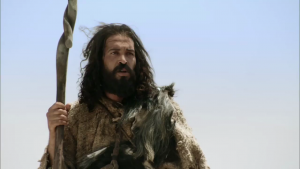JANUARY 03 – XMAS SEASON (Homily 01)
Growing into Christ-likeness – The Most Holy Name of Jesus
(1 Jn 2:29-3:6; Ps 98; Jn 1:29-34)
*************************************************************************************************
One of the delights of returning to northern Saskatchewan for seasonal ministry is seeing the adult children of couples I knew as children, and guessing who their parents are. Often, it is obvious because of the resemblance, other times more difficult. When I purchased gas at the store, I was able to guess correctly the clerk was a member of the Buffin clan.
Today’s liturgy allows St. John to once again, in both readings, remind us we are God’s children, invited to constantly grow into Christ-likeness, and lead us into a deeper appreciation of that joyful mystery.
Sr. Teresita Kambeitz OSU once wrote, “God accepts us as we are, but believes in whom we can become.” St. John would probably change that to, “God loves us as we are, but believes in whom we can become.”
There is a mystical progression to John’s writing. It all begins with the love the Father has given us, with how loved we are by God. Karl Rahner once remarked the people who were crucifying Jesus actually knew what they were doing – they were killing an innocent person. What they did not know, he claimed, was how loved they were by God. That may be our greatest failing as Christians, still not truly appreciating how loved we are by God, and thus belaboring ourselves with the task of trying to find that love in myriads of counterfeit ways.


In the gospel, St. John has John the Baptist identify Jesus as the “Lamb of God who takes away the sin of the world.” The Baptist goes on to claim he can make that statement because he saw the Holy Spirit descend upon and remain with the “one who baptizes with the Holy Spirit.” John’s baptism with water fell far short of the baptism of Jesus, as water which only soaks paper, falls short of fire which can transform that paper instantly. John could only preach repentance, he could not lead people to repent. John could only point out sin, he could not take away sin. John could teach about forgiveness, he could not forgive the sins of anyone. That was the role of Jesus, the humble one who allowed himself to be baptized by John.
According to Bishop Robert Barron, one of the earliest descriptions of Baptism is vitae spiritualis ianua, which means “the door to the spiritual life.” To grasp the full meaning of this is to understand something really decisive about Christianity. For Christianity is not primarily about “becoming a good person” or “doing the right thing” or in Flannery O’Connor’s famous phrase, “having a heart of gold.” Let’s face it: anyone—pagan, Muslim, Jew, nonbeliever—can be any of those things.
To be a Christian is to be grafted onto Christ and hence drawn into the very dynamics of the inner life of God. We become a member of his Mystical Body, sharing in his relationship to the Father.
It is so important that we are baptized “in the name of the Father, and of the Son, and of the Holy Spirit.” For Baptism draws us into the relationship between the Father and the Son, which is to say in the Holy Spirit. Baptism, therefore, is all about grace—our incorporation, through the power of God’s love, into God’s own life.
St. John writes about being purified, about being pure as God is pure, about being sinless like the one in whom there is no sin. That is the role of the Messiah, the Lamb of God – to forgive us all our sins, and to purify and transform us into new creatures through the power of the Holy Spirit. Our task is to be humble, honest, open, self-aware, admit our need for both forgiveness of our sins and healing of our sinfulness (that which makes us sin – our painful emotions and negative attitudes), and come to Jesus for both.
The result will be to live in our lives the psalm we proclaimed – “all the ends of the earth have seen the saving power of God.” A grade eleven student once gave me a card that surprisingly read, “May the Lord shine his light into the dark areas of your life.” That card disturbed me at the time, but now makes a lot of sense, because there were dark areas in my life needing both forgiveness and healing. Actually, there always is, as we never stop growing spiritually. So, all the ends of our physical, psychological and spiritual make-up need to see the saving power of God through God’s love as forgiveness and healing.
The result will be joy and inner freedom, rejoicing and gladness, joyful praise and exultant worship. We will be able to sing a new song to the Lord, because, in the words of St. Paul, we have become an entirely new creation, sharing in the inner life of the Trinity, the divine dance.
It is fitting that today the Church celebrates the Most Holy Name of Jesus. Since New Testament times, according to the Living With Christ, the name of Jesus has been honored. Paul writes “at the name of Jesus every knee should bend, in heaven and on earth and under the earth, and every tongue should confess Jesus Christ is Lord, to the glory of God the Father” (Philippians 2:10-11). The monogram of the name of Jesus, HIS (from the Greek IHSOUS), was widely promoted in the 15th century by John of Capistrano and Bernadine of Sienna, although the use of the letters of the name of Jesus as an emblem can be traced to the 8th century.
The Eucharist is our family meal as children of God with the Father, made possible by the unconditional love of Jesus, the Lamb of God, who died to take away the sins of the world and to reveal to us the depth of the Father’s love for all of creation.
May our celebration of this love of God as mercy and compassion, forgiveness and healing, fill us with joyful praise and empower us to live as children of God and of the light.



